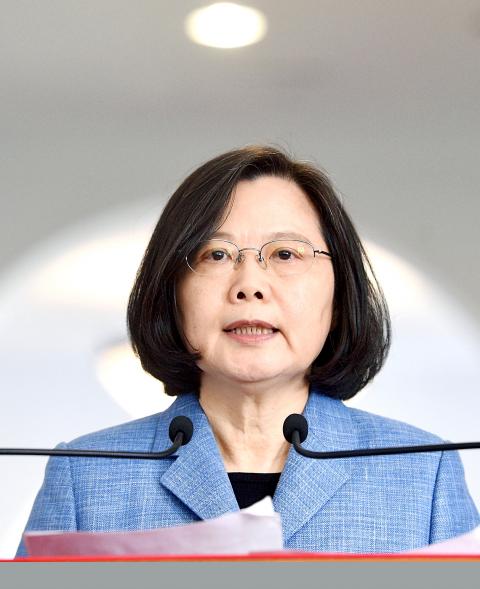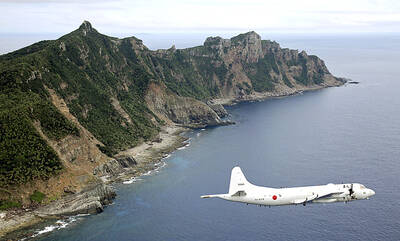President Tsai Ing-wen (蔡英文) yesterday said that Taiwanese would not accept any political agreement that undermines the nation’s sovereignty or democracy, amid controversy over the Chinese Nationalist Party’s (KMT) plan to ink a cross-strait peace treaty with Beijing if it returns to power next year.
Tsai made the remarks during a “hallway chat” with reporters at the Presidential Office Building after meeting with European Parliament-Taiwan Friendship Group chairman Werner Langen and a delegation of European lawmakers he led on a six-day visit to Taiwan.
During their meeting, the European Parliament members asked Tsai about her views on the signing of a peace agreement with Beijing, an issue that they noticed had been heatedly discussed during their stay in Taiwan, she said.

Photo: Peter Lo, Taipei Times
“I told them that Taiwanese society would not accept any political agreement that could destroy or hurt our national sovereignty, or put an end to Taiwan’s democracy,” Tsai said.
“I also told them that we are a democratic country guided by a clear path, which is that we want freedom, democracy, security and prosperity,” she said, adding that Taiwan’s future should be decided by its own people.
China’s military ambitions and its refusal to renounce the use of force against Taiwan are what have been causing regional instability and threatening regional peace, the president said.
Given this situation and Beijing’s plan to force the “one country, two systems” framework upon Taiwan, there would be no equal negotiations, nor would there be real peace, Tsai said.
Taiwanese “will handle this matter discreetly,” she added.
The idea of signing a peace treaty with China was proposed by KMT Chairman Wu Den-yih (吳敦義) during an interview on Thursday last week.
It has triggered heated debate among the public and politicians, and has prompted several civic groups to call for tightened regulations governing cross-strait political negotiations and the signing of treaties with Beijing.
The government has also proposed amendments to the Act Governing Relations Between the People of the Taiwan Area and the Mainland Area (臺灣地區與大陸地區人民關係條例) to subject cross-strait political talks to a referendum.
Tsai also downplayed the significance of an opinion poll published by the Chinese-language newspaper Apple Daily yesterday, which showed that she could be defeated in most hypothetical scenarios when running for re-election next year.
“Opinion polls are inanimate, but people’s hearts are living,” she said.
Tsai said that people told her the Democratic Progressive Party would not be able to get back on its feet for 20 years when she assumed its leadership in 2008, and when she ran for president in 2016, they also warned her that Taiwan was unlikely to see an economic growth rate of more than 1 percent.
“Nevertheless, we have overcome one barrier after another... There is never a shortage of oppression and we must overcome various challenges with a strong will,” she said.
As president, she is determined to bring Taiwan to the world and ensure that future generations of Taiwanese continue to be allowed to make their decisions freely, which is why she has decided to seek re-election, Tsai said.

MISINFORMATION: The generated content tends to adopt China’s official stance, such as ‘Taiwan is currently governed by the Chinese central government,’ the NSB said Five China-developed artificial intelligence (AI) language models exhibit cybersecurity risks and content biases, an inspection conducted by the National Security Bureau (NSB) showed. The five AI tools are: DeepSeek, Doubao (豆包), Yiyan (文心一言), Tongyi (通義千問) and Yuanbao (騰訊元寶), the bureau said, advising people to remain vigilant to protect personal data privacy and corporate business secrets. The NSB said it, in accordance with the National Intelligence Services Act (國家情報工作法), has reviewed international cybersecurity reports and intelligence, and coordinated with the Ministry of Justice Investigation Bureau and the National Police Agency’s Criminal Investigation Bureau to conduct an inspection of China-made AI language

LIMITS: While China increases military pressure on Taiwan and expands its use of cognitive warfare, it is unwilling to target tech supply chains, the report said US and Taiwan military officials have warned that the Chinese People’s Liberation Army (PLA) could implement a blockade within “a matter of hours” and need only “minimal conversion time” prior to an attack on Taiwan, a report released on Tuesday by the US Senate’s China Economic and Security Review Commission said. “While there is no indication that China is planning an imminent attack, the United States and its allies and partners can no longer assume that a Taiwan contingency is a distant possibility for which they would have ample time to prepare,” it said. The commission made the comments in its annual

‘TROUBLEMAKER’: Most countries believe that it is China — rather than Taiwan — that is undermining regional peace and stability with its coercive tactics, the president said China should restrain itself and refrain from being a troublemaker that sabotages peace and stability in the Indo-Pacific region, President William Lai (賴清德) said yesterday. Lai made the remarks after China Coast Guard vessels sailed into disputed waters off the Senkaku Islands — known as the Diaoyutai Islands (釣魚台) in Taiwan — following a remark Japanese Prime Minister Sanae Takaichi made regarding Taiwan. Takaichi during a parliamentary session on Nov. 7 said that a “Taiwan contingency” involving a Chinese naval blockade could qualify as a “survival-threatening situation” for Japan, and trigger Tokyo’s deployment of its military for defense. Asked about the escalating tensions

DISPUTE: A Chinese official prompted a formal protest from Tokyo by saying that ‘the dirty head that sticks itself out must be cut off,’ after Takaichi’s Taiwan remarks Four armed China Coast Guard vessels yesterday morning sailed through disputed waters controlled by Japan, amid a diplomatic spat following Japanese Prime Minister Sanae Takaichi’s comments on Taiwan. The four ships sailed around the Senkaku Islands — known as the Diaoyutai Islands (釣魚台) to Taiwan, and which Taiwan and China also claim — on Saturday before entering Japanese waters yesterday and left, the Japan Coast Guard said. The China Coast Guard said in a statement that it carried out a “rights enforcement patrol” through the waters and that it was a lawful operation. As of the end of last month,